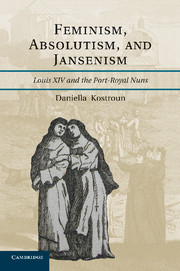Book contents
- Frontmatter
- Contents
- Acknowledgments
- Abbreviations
- Introduction
- 1 Jansenism as a “Woman Problem”
- 2 Controversy and Reform at Port-Royal
- 3 Jansenism's Political Turn, 1652–1661
- 4 The Limits to Obedience, 1661–1664
- 5 A Feminist Response to Absolutism, 1664–1669
- 6 The Unsettled Peace, 1669–1679
- 7 A Royal Victory, 1679–1709
- Conclusion
- Bibliography
- Index
- References
Conclusion
Published online by Cambridge University Press: 05 August 2011
- Frontmatter
- Contents
- Acknowledgments
- Abbreviations
- Introduction
- 1 Jansenism as a “Woman Problem”
- 2 Controversy and Reform at Port-Royal
- 3 Jansenism's Political Turn, 1652–1661
- 4 The Limits to Obedience, 1661–1664
- 5 A Feminist Response to Absolutism, 1664–1669
- 6 The Unsettled Peace, 1669–1679
- 7 A Royal Victory, 1679–1709
- Conclusion
- Bibliography
- Index
- References
Summary
Louis XIV destroyed Port-Royal-des-Champs in the fall of 1709 because the few elderly nuns living there had pushed him to his limits. They refused to compromise with Archbishop Noailles and insisted on their innocence in published documents that revived the formulary crisis of 1661. In the context of the emerging eighteenth-century public sphere, this strategy threatened Louis XIV's legacy of divine right leadership by suggesting that his religious policies had all along been implemented through illegitimate uses of authority.
The nuns' resistance had the potential to tarnish Louis XIV's legacy because he had built his claims to divine right authority on the back of a campaign to suppress Port-Royal. This campaign began under Mazarin, who first targeted the convent to undermine both the jurisdiction and the religious credibility of the rebellious Cardinal de Retz. Under Louis XIV, the convent took on greater importance as the king established personal rule by persecuting Jansenism as a matter of his own conscience. Even though only a few dozen women at Port-Royal resisted him in the early years of his personal rule, he singled them out as a major threat.
Treating the nuns as a serious threat helped Louis XIV justify policies that extended his authority over the French Church. Ever since Mazarin allied the interests of the Crown with those of Jansen's critics, the campaign against Jansenism and Port-Royal had become a way for the Crown to establish strategic alliances with the papacy while simultaneously shutting down opportunities for loyal opposition from French bishops and Parlement in the name of Gallican liberties.
- Type
- Chapter
- Information
- Feminism, Absolutism, and JansenismLouis XIV and the Port-Royal Nuns, pp. 239 - 246Publisher: Cambridge University PressPrint publication year: 2011



